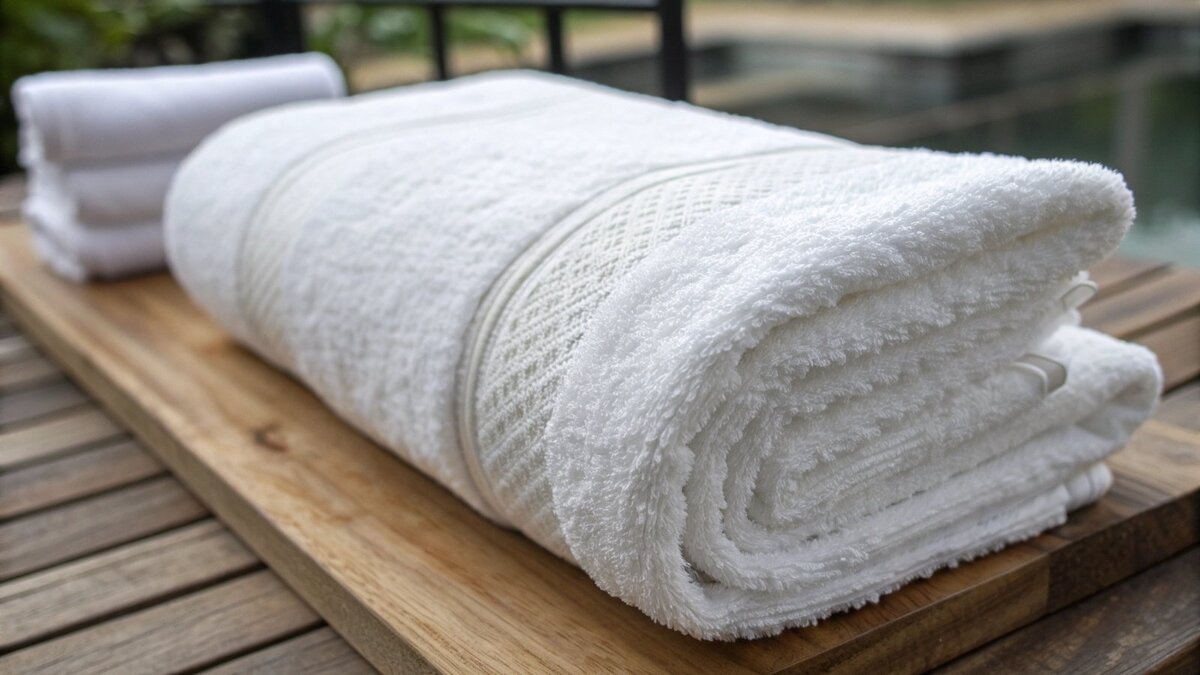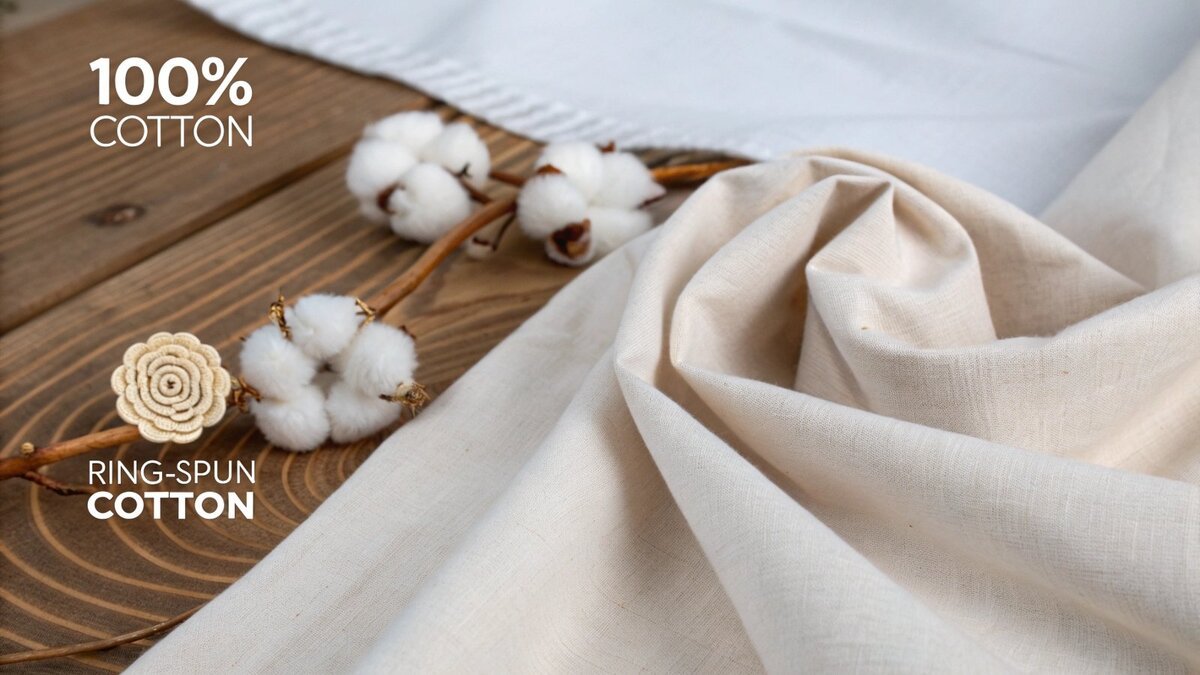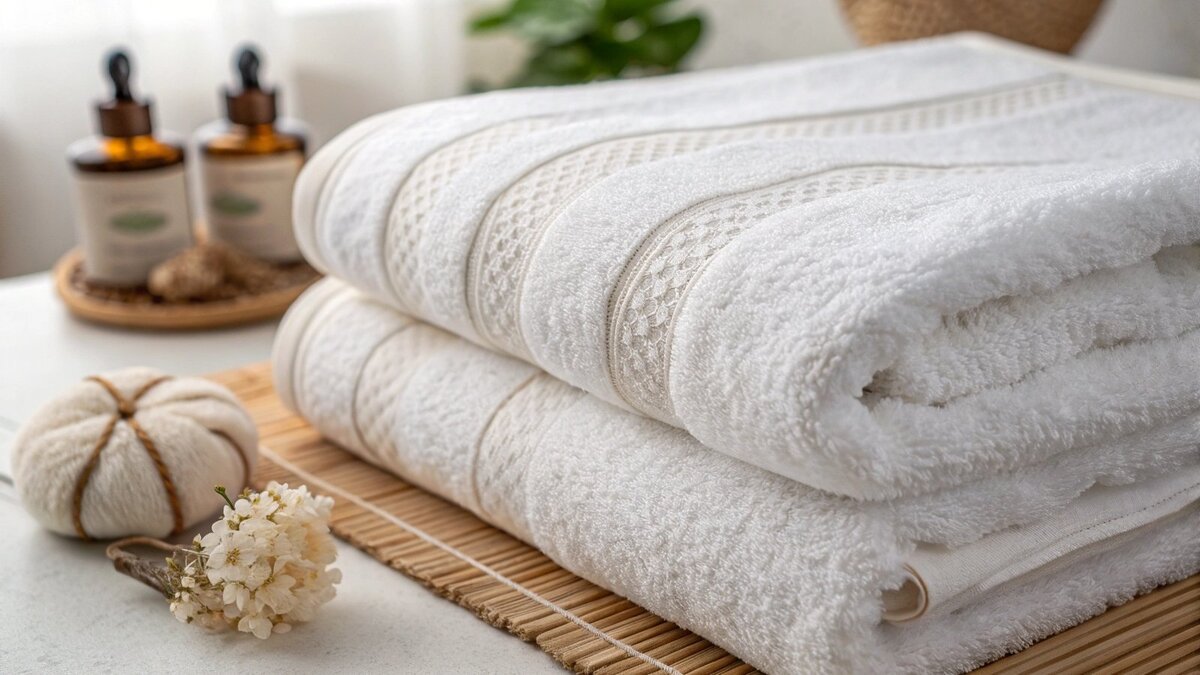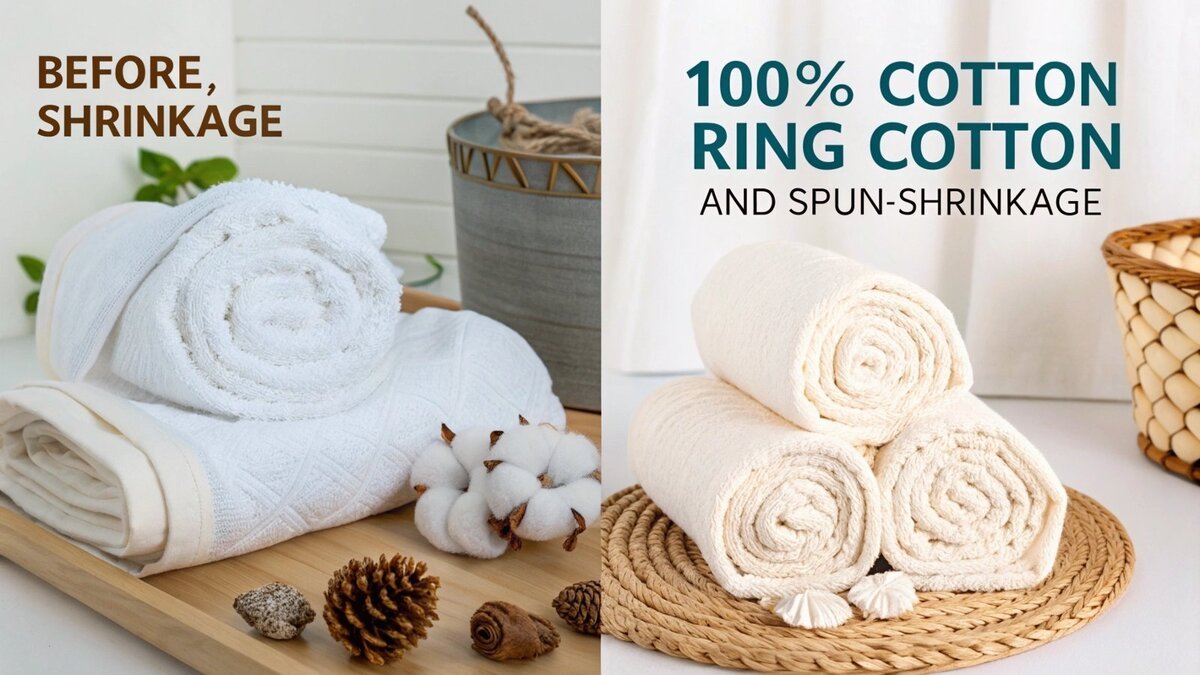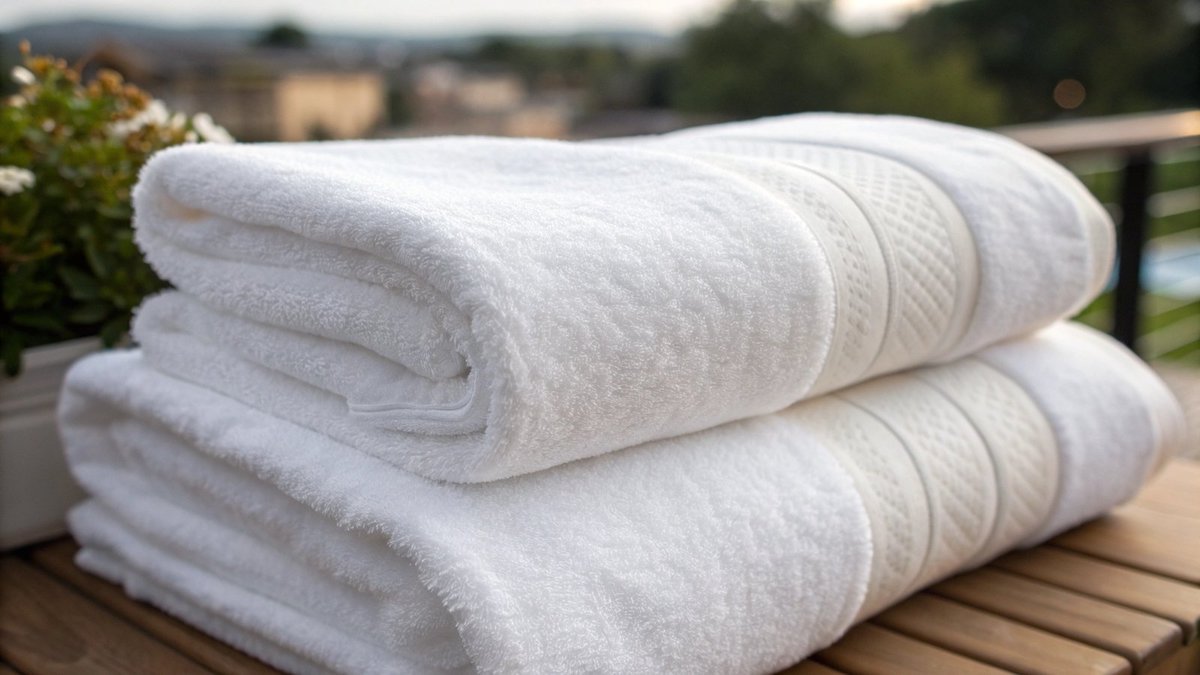Choosing the right cotton can feel overwhelming. A wrong move leads to rough, flimsy towels. Understanding ring-spun cotton is the key to selecting a truly superior and lasting product.
Yes, ring-spun cotton is excellent for towels. The process involves tightly twisting long and short cotton staples together, creating a yarn that is finer, stronger, and softer. This results in towels that are more durable, highly absorbent, and feel significantly more luxurious than standard cotton towels.
The term "ring-spun" might sound like technical jargon, but it’s one of the most important details to look for when sourcing premium towels. It directly impacts the end user’s experience and the towel’s lifespan, which are critical factors for any brand. In my years guiding clients, I’ve seen how choosing ring-spun cotton can elevate a product line from standard to luxury. Let’s break down exactly what makes it different and why it’s a smart choice for your business.
What is the difference between 100% cotton and ring spun cotton?
"100% Cotton" on a label feels safe, but it’s vague. You might be sourcing a lower-grade product without even realizing it. The secret is knowing that ring-spun is a process.
"100% cotton" just identifies the fiber source. "Ring-spun cotton," however, describes how that fiber is transformed into yarn. This process twists cotton strands into a very fine, strong, soft yarn, making it superior to the less-processed, standard carded cotton found in basic towels.
Let’s dive deeper into this distinction, as it’s fundamental to towel quality. I often have to explain this to new clients who are trying to balance cost and quality for their first big order.
The Standard Cotton Process (Carded Open-End)
Most basic cotton towels use what’s called carded cotton. In this method, the cotton fibers are brushed, or "carded," to align them in the same general direction. They are then spun into yarn. The process is quick and cost-effective, but it leaves many shorter fibers sticking out and the yarn itself is not as uniform or dense. This results in a towel that can feel a bit rough and is more prone to producing lint.
The Ring-Spun Process
Ring-spinning is a much more refined method. It starts with the same raw cotton, but the fibers are continuously twisted and thinned, creating a very tight, very fine, and very strong rope of yarn. This process pulls the shorter, weaker fibers into the twist, resulting in a smoother, cleaner yarn profile. It takes longer and costs more, but the benefits are undeniable.
Here’s a simple table to show the difference:
| Feature | Standard (Carded) Cotton | Ring-Spun Cotton |
|---|---|---|
| Yarn Feel | Rougher, more texture | Smoother, softer |
| Yarn Strength | Weaker, less uniform | Stronger, more consistent |
| Durability | Prone to pilling and shedding | Resists pilling, very durable |
| Lint Production | Higher, especially initially | Very low |
| Cost | Lower | Higher |
When a brand wants to build a reputation for quality, I always point them toward ring-spun. It’s a tangible upgrade that customers can feel instantly.
Is ring spun cotton good quality?
You need to justify a product’s price point. Choosing a cheaper cotton could harm your brand’s reputation with customer complaints. Ring-spun is a clear mark of high quality that you can build on.
Yes, ring-spun cotton signifies a high-quality product. The advanced manufacturing process removes impurities and aligns fibers into a stronger, softer, and more durable yarn. This superior quality directly enhances the towel’s performance, lifespan, and gives the user a truly luxurious experience.
When we talk about "quality" in the towel business, we’re not just talking about a feeling. We’re talking about measurable performance characteristics that affect customer satisfaction and your bottom line. For my clients, especially those in hospitality or retail, these details are everything. A towel is a functional item, but its quality reflects directly on their brand.
A Mark of Durability
The tight twist of ring-spun yarn is its secret weapon. This structure prevents the individual fibers from fraying or breaking easily. The result? Towels that resist pilling, even after dozens of wash cycles. They also shed significantly less lint. For a hotel manager or a gym owner, this is a huge deal. It means the towels look newer for longer, reducing replacement costs and maintaining a premium look.
The Softness and Absorbency Advantage
The fineness of ring-spun yarns allows us to weave more of them into every square inch of a towel. This creates a denser, plusher pile with more loops. More loops mean two things:
- More Softness: The towel feels fuller and more comforting against the skin.
- More Surface Area: This is key for absorbency. A denser pile can soak up more water, more quickly.
A Smart Investment for Your Brand
While the upfront cost per towel might be slightly higher than for a standard carded cotton product, it’s a strategic investment. The extended lifespan, improved performance, and premium feel contribute to higher perceived value and greater customer loyalty. It’s the difference between a customer thinking "this is a towel" and "this is a great towel."
Will 100% ringspun cotton shrink?
Shrinkage is a major worry for any cotton product. You fear that your perfectly sized towels will become too small after the first wash. The key is to know what to expect and how to manage it.
Yes, all 100% cotton products, including ring-spun cotton, will experience some shrinkage. This happens mostly during the first wash-and-dry cycle. However, a quality manufacturer anticipates this. We typically see shrinkage of around 5-7%, which is standard for high-quality, natural-fiber textiles.
I get this question from nearly every client, and it’s a valid concern. No one wants to order a batch of 500 bath sheets only to find they’ve turned into bath towels after the first cleaning. Here’s how we at TowelTrend handle it and what you should know.
Why Shrinkage Happens
It’s a natural process. During a towel’s manufacturing—weaving, dyeing, finishing—the cotton yarns are held under tension. When you wash the towel for the first time, especially with the heat and tumbling of a dryer, that tension is released. The fibers relax and settle into their natural, more compact state. This is what causes shrinkage.
The Manufacturer’s Role in a Good Towel
As producers, we don’t just ignore shrinkage; we plan for it.
- Pre-Washing: Some finishing processes involve pre-washing the fabric in large, industrial machines to initiate a controlled shrink before the towels are even cut and sewn.
- Sizing Adjustments: We account for shrinkage in our cutting patterns. If a client orders a 70×140 cm bath towel, we cut the fabric larger. We know from experience that after it goes through its final wash and finishing, it will settle at the correct target dimension. This ensures the final product you receive matches the specs you ordered.
Care Instructions Matter
To minimize further shrinkage after the initial phase, proper care is important. We always advise our clients to pass these instructions on to their customers:
- Wash in cool or warm water, not hot.
- Tumble dry on a low or medium heat setting.
- Avoid over-drying, as excessive heat is the main cause of fiber shrinkage.
By working with a manufacturer who understands and manages this process, you can be confident that the towels you sell will maintain their size and quality.
What does 100% ring spun cotton feel like?
It’s difficult to describe a texture with just words. You’re trying to sell a product online where customers can’t touch it. Using clear comparisons is the best way to convey the feeling.
100% ring-spun cotton feels incredibly soft, smooth, and dense against the skin. Unlike the slightly rougher texture of standard cotton, it’s smoother because there are no stray fibers sticking out. It has a plush, substantial feel, much like the towels you’d find in a high-end hotel.
Trying to sell a tactile product without the sense of touch is one of the biggest challenges in e-commerce. I’ve spent years helping clients articulate this difference. The "hand feel" is often the final convincer. When we send samples, the ring-spun option almost always wins once the client has it in their hands.
So, how can we paint a picture with words?
A Tale of Two Textures
Imagine a standard, economy-grade towel. It does the job, but it can feel a little stiff or even scratchy. The surface has a visible, slightly uneven texture. Now, think of a ring-spun cotton towel. It feels different from the moment you pick it up.
Key Sensory Differences
I find that breaking it down helps my clients build their product descriptions. A table can be very effective for internal training or marketing copy.
| Sensory Aspect | Standard (Carded) Cotton | 100% Ring-Spun Cotton |
|---|---|---|
| Surface Feel | A bit coarse, you can feel the individual loops. | Smooth, almost silky. The loops feel uniform and soft. |
| Density/Weight | Can feel thinner and lighter. | Feels more substantial, plush, and weighty. |
| Feel After Washing | May become stiffer over time. | Tends to get even softer and fluffier with washing. |
| Against the Skin | Functional, but not particularly comforting. | Luxurious and comforting, like a warm hug. |
Years ago, I was in a meeting with a potential client for a new boutique hotel chain. We had two sample towels on the table, identical in color and size but different in cotton type. He touched the standard one and nodded. Then he picked up the ring-spun one, closed his eyes for a second, and just said, "Okay. That’s it. That’s the one." That tactile difference is the real selling point. It communicates quality better than any words can.
Conclusion
Ring-spun cotton is the superior choice for towels. It delivers measurable gains in softness, strength, and absorbency, turning a simple product into a premium experience your customers will value.

